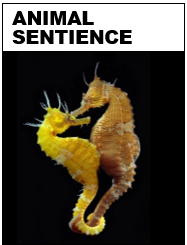 | |
| Discipline | Ethics, animal behavior |
|---|---|
| Language | English |
| Edited by | Stevan Harnad |
| Publication details | |
| History | 2016–present |
| Publisher | WellBeing International |
| Yes | |
| License | CC BY |
| Standard abbreviations | |
| ISO 4 | Anim. Sentience |
| Indexing | |
| ISSN | 2377-7478 |
| LCCN | 2015201663 |
| OCLC no. | 1002278624 |
| Links | |
Animal Sentience: An Interdisciplinary Journal on Animal Feeling is a peer-reviewed academic journal. [1] [2] Its subject matter, animal sentience, concerns what and how nonhuman animals think and feel as well as the scientific and scholarly methods of investigating it and conveying the findings to the general public. [3] The initial publisher was the Animal Studies Repository of the Institute for Science and Policy of The Humane Society of the United States, [4] now the Animal Studies Repository of WellBeing International. [5] The editor-in-chief is Stevan Harnad. [6] [7]